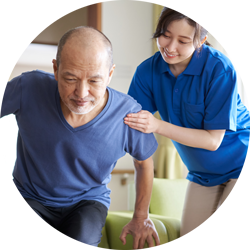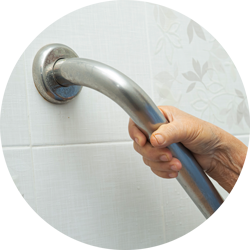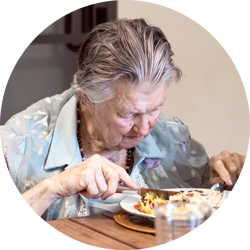Help with Mobility
Senior help with mobility refers to assistance and support provided to elderly individuals who may have difficulty moving or getting around on their own. This assistance can come in various forms and is designed to improve the quality of life and independence of seniors who may be facing physical limitations or mobility challenges due to aging or health conditions. Here are some key aspects of senior help with mobility:

1. Personal Care Assistance
Seniors may receive help with activities of daily living, such as bathing, dressing, and grooming. Caregivers can assist with these tasks to ensure seniors can maintain their personal hygiene and appearance.

2. Ambulation Support
Many seniors require assistance with walking or using mobility aids like canes, walkers, or wheelchairs. Caregivers can provide support and ensure that seniors can move around safely.

3. Transfer Assistance
Transferring from a bed, chair, or wheelchair can be challenging for seniors. Caregivers are trained to assist with transfers to prevent falls and injuries.

4. Medication Management
Some seniors may need help with medication management, which can include reminders to take medications, assistance with pill dispensers, and tracking medication schedules.

5. Home Modifications
Making modifications to the senior’s home can improve mobility and safety. This might include installing grab bars, ramps, or making changes to the layout to accommodate mobility devices.

6. Transportation
Seniors who are no longer able to drive may need assistance with transportation to medical appointments, social outings, and other activities. Caregivers or transportation services can provide this support.

7. Fall Prevention
Falls are a significant risk for seniors. Caregivers can help by identifying fall hazards, assisting with exercises to improve balance, and offering supervision to reduce the risk of falls.

8. Physical Therapy
In some cases, seniors may benefit from physical therapy to improve their mobility. A physical therapist can create a personalized exercise and rehabilitation plan to enhance strength, balance, and overall mobility.

9. Assistive Devices
Seniors may benefit from using various assistive devices, such as canes, walkers, scooters, or stair lifts. Caregivers can help select, set up, and maintain these devices.

10. Emotional and Social Support
Isolation and depression can be common among seniors with limited mobility. Providing emotional support, companionship, and engaging in social activities can significantly improve their well-being.

11. Nutrition and Meal Support
Proper nutrition is essential for maintaining strength and mobility. Caregivers can help with meal preparation, grocery shopping, and ensuring seniors are eating well-balanced meals.

12. Hydration Management
Staying hydrated is crucial for overall health. Caregivers can remind seniors to drink enough water and ensure they have easy access to beverages.
Senior help with mobility is often customized to the individual’s specific needs and can be provided in a variety of settings, including in-home care, assisted living facilities, or nursing homes. The goal is to enhance seniors’ independence, safety, and overall quality of life, allowing them to age in place or within a supportive community while maintaining their dignity and comfort.
